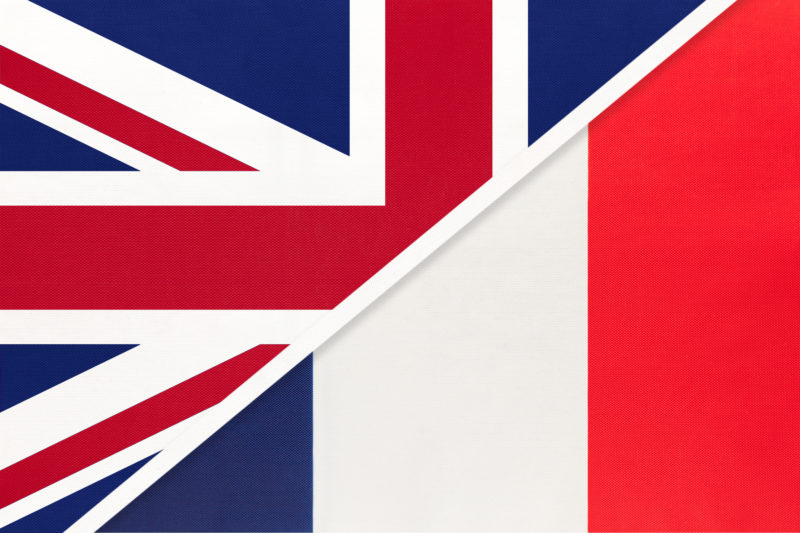How Different Is French From English?
As an English speaker, you will find that French is actually one of the easiest languages to learn. But learning a new language can be intimidating to some people. Yes, French has some difficulties and a few major differences from English. But with a bit of know-how and practice, you’ll start speaking fluently fast. Here’s a quick comparison of French vs English to get you started.
English Vs French
You don’t need to memorize this list. In fact, you’ll notice a lot of the differences here are on grammar. And grammar shouldn’t be your priority, speaking should be. That said, read over this list to familiarize yourself with how French vs English differ, so you don’t get confused in your lessons. With a general understanding of French, you’ll get closer to speaking like a native.

1) French Nouns Have Genders
English is one of the simplest European languages because all nouns have the same articles. This means that English nouns are gender-neutral, except for nouns that refer specifically to a living creature that has a gender, such as “hen” and “rooster.”
All French nouns are either masculine or feminine. As a new learner, at times, it may feel like there is little or no logical reason why a given word takes a particular gender: for example, a football is feminine while a handkerchief is masculine. Some French words are gendered based on their endings. By paying attention to common endings, you can start to guess some genders.
Gender affects sentence construction as well. Each word’s article must match the gender of its noun. In other words, the English word “the” may be masculine or feminine. Other parts of speech, including relative pronouns and adjectives, must also match the gender of the noun.
2) Adjectives Come After Nouns in French
Something you may not notice when speaking English is that adjectives come before the nouns they describe. This is not the case in French, where the adjective most often comes after the noun it describes. Whereas in English, we’d say, “She is a smart girl”, in French, one would say the equivalent of “She is a girl smart.”
3) French Uses Negation Differently
In English, you negate verbs by adding the negation before the verb: “I never hesitate”, “I don’t procrastinate” — or after auxiliaries like “be” and “have”. French uses double-negation surrounding the verb as if saying “I not hesitate ever” or “I not procrastinate not”. Negating adjectives is much easier though: like in English, you can just add a prefix (“inefficient”) or “not” (“not lazy”).
4.) French Has Many False Cognates
As noted earlier, French vs English share many common words. These are called “cognates”, and there are many of them. But not every similar-sounding word has the same meaning. For example, the French word meaning “to attend” looks like “to assist”, and the French word meaning “great” looks exactly like “formidable”. These are called “false friends” or “false cognates”.

5.) In French, “To Do” Is Not an Auxiliary Verb
In English, we often use “to do” as an auxiliary to create interrogations, negations, and emphasis: “Do you learn?”, “I don’t learn”, “I DO learn”. French does not do this (and here the first “do” is such a “to do” being used as auxiliary). For questions, they invert subjects and verbs (“Learn you?”), use questioning intonations (“You learn?”), or add something before the question (“Is it that you learn?”). For negations, see above. For emphasis, they use adverbs.
6.) You Can Use the Verb “To Have” to Express a Feeling in French
In English, we talk about feelings using some form of a “being” verb, like “am.” In French, the verb “to have” is often used instead. For example, instead of saying “I am 20 years old,” a French-speaker would say “I have 20 years”. This is similar to many other traits, such as hunger (“I have hunger”) or fear (“I have fear”).
7.) French Has Fewer Prepositions
English relies heavily on prepositions to provide details in discussions because we focus on describing where something is oriented in time and space. For example, “The cat is sitting on top of the chair, and the dog is sleeping under it.” While French certainly has prepositions, there are fewer of them in French than there are in English.
This can cause some ambiguity for English speakers who are accustomed to more precise descriptions of location. However, having fewer words to choose from can also make it much easier to remember all of them.
8.) French Uses Tenses Differently
English speakers use tense largely to show if something happened in the past, present, or will happen in the future. French takes a slightly different approach, using tense to convey a specific meaning.
This isn’t entirely foreign to English speakers because we tend to use perfect tense in the professional world. It is similar in French. But it is used in everyday speech, not just to show professionalism.

9.) Sentences Are Capitalized And Punctuated Differently
One of the most noticeable differences in punctuation between English vs French is that French often uses contractions. Articles and pronouns are contracted, combining them with other words to simplify speech like we do in English in “I’ll” or “won’t”. Once you learn how to do it correctly, you will find it much easier. It just takes a bit of work to get it to feel natural.
10.) Spelling Is a Bit Harder in French
It’s the only European that is more notorious for its difficult spelling than English. The good news is French is the main reason why English is so difficult to spell. And both languages share many spellings. Like English, there are a lot of silent letters, just not typically the same letters.
As you learn vocabulary, take the time to review the spelling so that you can consistently spell it correctly. Imagine the word as you speak. And over time, it will get easier to see the patterns.
The Easiest Way To Learn French
French isn’t a hard language for native English speakers. The first step is to believe you can learn French. After all, you’ve already learned one language! The second step is to relax and enjoy the process. With a little practice, you’ll get used to the difference. And as you learn more about French, you’re already doing what you can to get familiar with the language. Keep it up!







